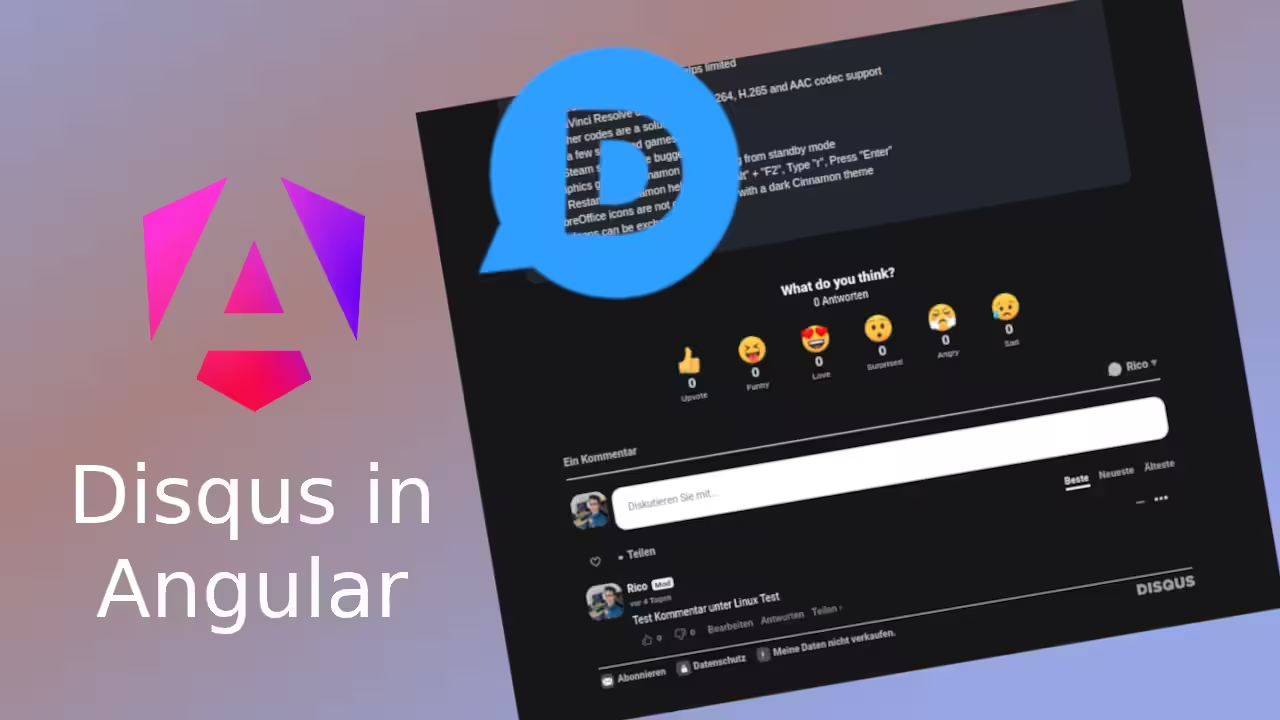What is Disqus?
Disqus is a practical solution for integrating a comment function on a website without having to develop your own comment system. Disqus provides the database and offers management functions for comments.
How to use Disqus in Angular?
While ngx-disqus offers a ready-made solution for integrating Disqus with Angular, a manual implementation can be an attractive alternative. This avoids additional dependencies and only uses the script provided by Disqus.
How to integrate Disqus with Angular manually?
Integrating Disqus with Angular works a little differently because Angular is a single page application (SPA). The script cannot simply be embedded as a script tag. When the content changes, the Disqus reset function must also be called correctly. A Disqus service and a Disqus component are required:
Create a Disqus service
First you need a service that can load Disqus:
import { inject, Injectable, Renderer2 } from "@angular/core"; import { DOCUMENT } from "@angular/common"; @Injectable({ providedIn: "root", }) export class DisqusService { private disqus: any; private readonly shortname: string = "your-disqus-shortname"; private readonly document = inject(DOCUMENT); loadDisqus(renderer: Renderer2, id: string): void { this.disqus = (window as any)["DISQUS"]; if (!this.disqus) { (window as any).disqus_config = function () { this.page.identifier = id; }; const script = renderer.createElement("script"); script.type = "text/javascript"; script.src = "https://" + this.shortname + ".disqus.com/embed.js"; renderer.appendChild(this.document.body, script); } else { (window as any)["DISQUS"].reset({ reload: true, config: function () { this.page.identifier = id; }, }); } } }Create a Disqus component
In order to be able to use Disqus again easily, a Disqus component is useful. The Disqus component should only load Disqus when the user has scrolled to the comments. This avoids unnecessary HTTP requests.
disqus.component.html:<div id="disqus_thread"></div>disqus.component.ts:import { Component, ElementRef, Renderer2, ViewChild, OnChanges, PLATFORM_ID, inject, input } from "@angular/core"; import { DisqusService } from "src/app/services/disqus.service"; import { faComment } from "@fortawesome/free-regular-svg-icons"; import { isPlatformBrowser } from "@angular/common"; import { FaIconComponent } from "@fortawesome/angular-fontawesome"; import { RouterLink } from "@angular/router"; import { TranslateModule } from "@ngx-translate/core"; @Component({ selector: "app-disqus", templateUrl: "./disqus.component.html", styleUrls: ["./disqus.component.scss"], imports: [FaIconComponent, RouterLink, TranslateModule], }) export class DisqusComponent implements OnChanges { private disqusS = inject(DisqusService); private renderer = inject(Renderer2); private elementRef = inject(ElementRef); private platformId = inject<object>(PLATFORM_ID); readonly identifier = input<string>(); disqusDiv = ViewChild("disqusDiv"); private observer: IntersectionObserver | undefined; faComment = faComment; ngOnChanges(): void { if (!isPlatformBrowser(this.platformId)) return; if (this.observer) this.observer.disconnect(); if (!this.identifier()) return; this.observer = new IntersectionObserver((entries) => { entries.forEach(async (entry) => { if (entry.isIntersecting) await this.isVisible(); }); }); this.observer.observe(this.elementRef.nativeElement); } ngOnDestroy(): void { this.observer?.disconnect(); } async isVisible() { const identifier = this.identifier(); if (identifier) { await this.disqusS.loadDisqus(this.renderer, identifier); this.observer?.disconnect(); } } }Use Disqus component
Now we can use the Disqus component in Angular:
<app-disqus [identifier]="yourID"></app-disqus>
